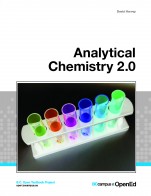The Chemistry LibreTexts library is a principal hub of the LibreTexts project, which is a multi-institutional collaborative venture to develop the next generation of open-access texts to improve postsecondary education at all levels of higher learning. The LibreTexts approach is highly collaborative where an Open Access textbook environment is under constant revision by students, faculty, and outside experts to supplant conventional paper-based books.
LibreTexts are custom developed for individual instructors/classes and schools. The Modules in the Core supplement the LibreTexts.
Analytical chemists work to improve the ability of all chemists to make meaningful measurements. Chemists working in the other traditional areas of chemistry, as well as in interdisciplinary fields such as medicinal chemistry, clinical chemistry, and environmental chemistry, need better tools for analyzing materials. The need to work with smaller samples, with more complex materials, with processes occurring on shorter time scales, and with species present at lower concentrations challenges analytical chemists to improve existing analytical methods and to develop new ones.
Typical problems on which analytical chemists work include qualitative analyses (What is present?), quantitative analyses (How much is present?), characterization analyses (What are the sample’s chemical and physical properties?), and fundamental analyses (How does this method work and how can it be improved?).






